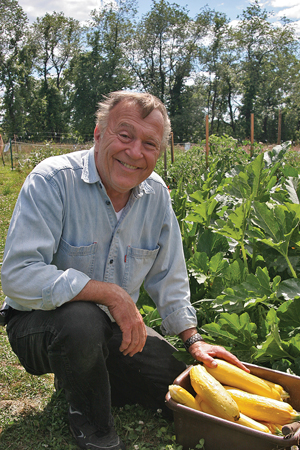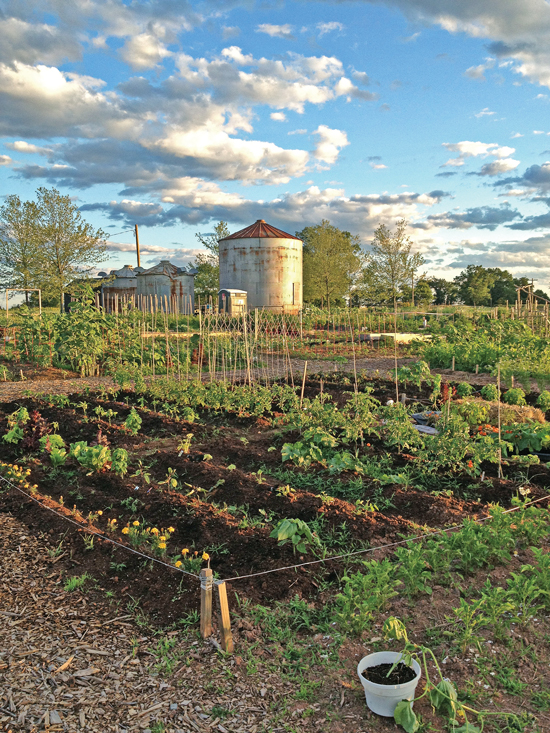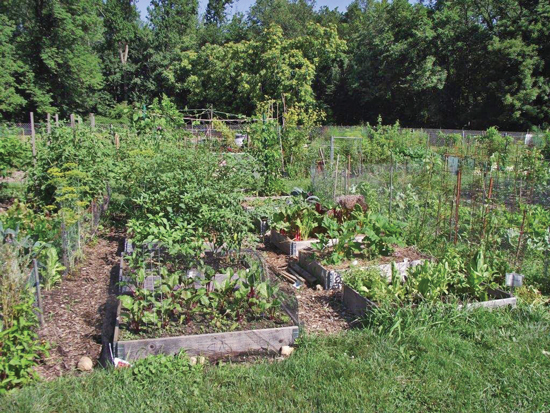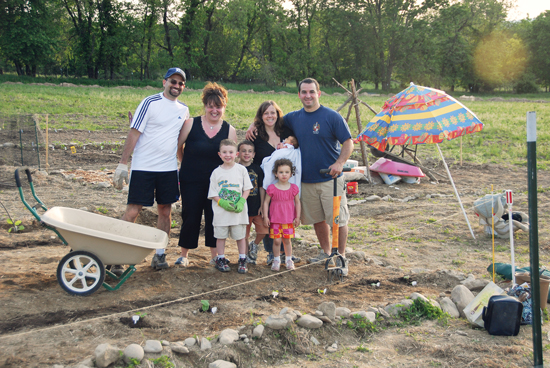
Who can think of an argument for not having a garden? It’s not easy to do, but you still might have a good reason for not growing your own. Maybe you’ve got a bad back, or a lethal allergy to insect bites. Perhaps the deer have finally gotten the best of you. You might not have enough room in your yard, or maybe you have no yard at all. But even if any of these apply to your personal situation, most likely, in the best of all worlds, you’d like to have a garden in your backyard. Gardens are good.
In the Garden State, rows of carefully tended vegetables have decorated the summer landscape for hundreds of years, either in farmers’ fields or on family plots. Lately, more and more of New Jersey’s edibles emerge in community gardens, which are, in their simplest description, pieces of land subdivided into individually tended parcels. In urban environments, the strategy of community gardening is clear, as citizens without soil are able to combine their resources to gain access to a large lot, or even a rooftop, where they can cultivate “homegrown” items for their kitchens. Those metropolitan shared spaces are not easy to come by, and usually entail skillful organization for their procurement, frequently aided by funds from public or other benevolent sources. The politics of modern community gardening often rely on ideas about environmental sustainability and community open space, concepts that have also flourished in our maturing suburban culture.
The Rutgers School of Environmental and Biological Sciences has implemented an ongoing research project investigating the social and spatial aspects of community gardens and urban agriculture across New Jersey, aptly named Gardening in the Garden State. The study has found that community gardens in the open spaces of outback New Jersey, where the need would seem less urgent, are popping up more often than anywhere else. Larger organizations or institutions sponsor many of the gardens by providing space or funds. Others are organized by dedicated individuals or volunteer groups. There are common experiences and challenges that are engaged in each specific context, and the research helps connect those efforts in a way that improves community gardening statewide.
When World War II shook America’s foundation, neighborhoods formed cooperatives and pooled their energy and resources, growing twenty million Victory Gardens in backyards, front yards, empty lots and rooftops across the country. These days the threat is more ambiguous, but it seems that in their most progressive form, today’s community gardens grow communities as well as good things to eat.

The agenda at Duke Farms is far-reaching and ambitious, one that includes some of the country’s most advanced research and innovative technological applications. But no component of the Foundation’s mission to serve as a model of environmental stewardship and sustainability is more easily understood and accessible than Duke’s community garden. It began with 210 plots staked out in the 2,740-acre estate-turned-park in Hillsborough in the spring of 2011. This year’s garden, now the largest “allotment style” community garden in the country, includes 465 spots cultivated by gardeners that either live or work in Somerset County. In addition to paying a small fee, members are expected to contribute four hours of volunteer time for each plot that they rent. Participants also receive a compulsory education in the form of a garden orientation, a handbook, and choice of classes offered throughout the season that includes the prerequisite Introduction To Organic Gardening. In order to encourage communication and assistance among like-minded gardeners, the all-organic gardens are divided into seven neighborhoods: Tomatoville, Cauliflower Corner, Turnip Town, Garlic Grove, Cucumber City, Rutabaga Ridge and Broccoli Boro.
“The diversity of gardeners as well as garden styles is wonderful,” says Nora Wagner, Director of Strategic Planning and Programs at Duke Farms. “We have everything from pizza gardens specializing in tomatoes, basil and peppers; to colonial gardens showcasing flowers and herbs; to garden plots with veggies that you can only find in specialty markets.” For less than $100, counting seeds and minimal supplies, gardeners can walk away with baskets full of good food, a solid foundation in the principles of organic gardening and, most likely, a bunch of new friends.

Established way back in 1978, the Morris County Park Commission’s Community Garden at Frelinghuysen Arboretum is one of the longest running in the state. There are 113 plots, half of which produce year round crops using devices like row covers and cold frames. Although most community gardens in New Jersey have some sort of “giving garden”, or at least a donation shed and cooler next to the garden exit, the growers at Frelinghuysen have a particular dedication to people who lack a stable source of nutrition. Even in a county as affluent as Morris, the statistics regarding food insecurity are staggering. The Interfaith Food Pantry of Morris, just one of over fifty food pantries in the county, gives out nearly two tons of food every day! In 2014, 11,400 people were served, 35% of them under the age of 18.
After meeting with the Nutrition Educator at the Interfaith Food Pantry, the community gardeners came up with method for growing high yield vegetables in small spaces. The gardeners divided a ten-by-twenty foot plot into ten three-by-four foot raised beds, each planted and tended by one volunteer gardener, eliminating any doubt as to when to water, fertilize, weed and harvest. The result was nearly 2,000 pounds of fresh vegetables grown and delivered to the food pantry in 2014.
Rutgers Master Gardeners of Morris County tend educational plots at various community gardens, where they demonstrate different growing techniques for particular vegetables and are on hand to answer gardening related questions. One hundred percent of the produce grown in each of the demonstration plots is donated to a local food pantry. The Mental Health Associates of Morris County also use community garden plots as a type of horticultural therapy for their clients and donate all of their harvest.
“Studies have shown that people’s lives are improved through the cultivation and enjoyment of plants, that gardens foster bonds of friendship and support, and that community gardeners and their children eat healthier diets than non-gardening families,” says Cynthia Triolo, Horticultural Program Specialist at Frelinghuysen. “Community gardens reduce our carbon footprint and create greenspace that filters rainwater and restores oxygen to the atmosphere thereby reducing water and air pollution. Ask any community gardener and they will tell you that growing one’s own food is a tremendous source of pride and joy, but that the connection made with other gardeners, and with the earth itself are just as important.”
Linda Grinthal and her husband grew up in Bergen County, but decided to move west when they had their first child. “We had a friend who lived in Green Township who had been urging us to become ‘country folk’ and we just went for it,” explains Linda. “I apprenticed on a farm in Green for ten years, then we bought the property we’re now on. When I gave birth to our last (?) child at age 46 I gave up my financial planning business to stay at home and run a day care center on the farm. But the dream for the property was always Community Supported Garden.”
Today’s Sunset View Farm in Andover Township is a fifty-plot Community Supported Garden on a twenty-acre teaching farm, Sunset View Farm. “Survival gardening is the focus here”, says Grinthal. “And not in a doomsday sort of way. Our gardeners love the idea of growing food they need to survive, knowing they can be self-sufficient if they ever need to be. They love that we are all natural, and that we grow food the way our ancestors did, not using chemicals and poisons. We have fun with companion planting, pairing up vegetables that enhance each other’s best qualities. And we grow a little of everything, like vegetables, fruits, nuts, herbs and flowers.”
The gardeners are offered free workshops to help them perfect their gardening skills, and the public is welcome to attend with a suggested donation. This year Sunset Vista was approved by the Division of Developmental Disabilities to offer workshops for people with autism, and the gardeners plan to install a Therapeutic Garden to enable individuals with paralysis or other limited mobility to garden with the mainstream “garden family”. Each year, supporters sponsor free plots for food-insecure local families. Many local non-profits garden at Sunset Vista and donate their fresh produce to local food pantries.

Sunset Vista, a 501c3 non-profit, is dependent upon garden lease and workshop revenue, along with public donations. It is all about community at this Community Garden that has been made possible through the efforts of over forty volunteers—plus Sheriff Strada’s SLAP program—and over one-hundred gardeners who have joined with senior groups, scout groups, church groups, social services and others to create a place for health-minded people to meet and share their love of natural gardening and fresh-grown produce.
If you don’t have the time or inclination to commit to a community garden, but still want the advantage of fresh, nutritious produce, a Community Supported Agriculture (CSA) is a good way to support your local farmer. Members of a CSA pledge financial support for a particular farm in return for shares of the farm’s harvest throughout the season. More and more New Jersey farmers have turned to the model as public desire for fresh food on the table has surged.
Three generations of Godlewskys have farmed the black dirt of Warren County’s Great Meadows, initially growing produce exclusively for wholesale commercial markets. As those markets declined in the early 1980s, the family branched off into horticulture, erecting over thirty-five greenhouses for wholesale and retail growing, and although vegetables were always part of the package, Godlewsky’s became well-known for their flowers and landscape plants.
“People seem to only associate us with just flowers and plants, when we never gave up growing vegetables in the fields,” says Patty Godlewsky. “The challenging end of our business now seems to be convincing people that we grow and sell produce retail, even though they see fields of produce as they drive up to the greenhouses. Our farm has that beautiful black rich muck that produces excellent vegetables with their own distinctive taste.” Patty has formed a CSA, called the Veggie Club, by which members can reserve some of the naturally-grown, GMO free, delectable produce that emerges from those prolific fields. The Veggie Club is particularly flexible—and affordable—as customers can pay on a weekly basis, rather than in advance for the whole season. Members can also join at any time during the season and have a choice of three different size containers for their allocation.
But what do you do when you find a bunch of radishes, cilantro, collard greens, broccoli rabe, or an eggplant in your box? How do you turn these items into savory meals? To help you along with that, this summer and fall, Rutgers Cooperative Extension’s (RCE) Department of Family and Community Health Sciences (FCHS) of Warren County and bring you Farm to Fork for Families at Godlewsky Farms. On select Thursdays from July through October, FCHS will teach families how to prepare some of the items in their weekly food box. The free classes (or with a minimal fee to cover cost of supplies) will present different recipes for farm fresh dinners, as well as canning lessons to show how to store items for the winter months.
Throughout New Jersey, the Cooperative Extension, which celebrated its one-hundredth anniversary in 2014, educates residents, farmer and families in a variety of topics; from nutrition and healthy lifestyles, commercial agriculture and aquaculture to home lawn and gardening. For youth they are committed to the New Jersey 4-H Youth Development Program that offers countless opportunities and teachers leadership for youth ages K-13. FCHS covers the topics of food and nutrition that not only focus on overall health, but also on healthy families. Visit the website and read about a variety of topics like “The Real Value Meal...Eating Together,” obesity and disease prevention, food safety and school wellness.
The mission of the American Community Gardening Association (ACGA) is to build community by increasing and enhancing community gardening and greening across the United States and Canada. The organization facilitates the formation and expansion of state and regional community gardening networks; develops resources in support of community gardening; and, encourages research and conducting educational programs. The following local community gardens are listed as ACGA members: